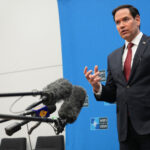Saudi Princess Reema says kingdom wants integration with Israel
Speaking at the Aspen Ideas Festival, the Saudi ambassador to the U.S. laid out Saudi support for a two-state solution

Screenshot
Saudi Ambassador to the U.S. Princess Reema bint Bandar Al Saud
Saudi Ambassador to the U.S. Princess Reema bint Bandar Al Saud said on Saturday afternoon that Israeli-Palestinian peace was in line with Vision 2030, the kingdom’s massive social reform project. “We want to see a thriving Israel,” she said. “We want to see a thriving Palestine. Vision 2030 talks about a unified, integrated, thriving Middle East and last I checked, Israel was there. We want a thriving Red Sea economy.”
The ambassador, speaking in conversation with NBC’s Andrea Mitchell at the Aspen Ideas Festival in Aspen, Colo., said that the Saudi kingdom focuses on integration over normalized relations with Israel. “We don’t say normalization, we talk about an integrated Middle East, unified [as] a bloc like Europe, where we all have sovereign rights and sovereign states, but we have a shared and common interest,” she explained. “So that’s not normalization. Normalization is you’re sitting there, and I’m sitting here, and we kind of coexist, but separately. Integration means our people collaborate, our businesses collaborate, and our youth thrive.”
Princess Reema added that the policies of Israeli Prime Minister Benjamin Netanyahu’s government toward the Palestinians are complicating efforts to reach a broader peace in the region. Prompted by a question from Mitchell, Princess Reema said the Israeli government’s current approach in the West Bank is “so terrible,” calling settlements in particular “problematic” and “something that we’re trying to solve.”
“I think the conflict has gone [on] for so long, that these walls have been built psychologically and emotionally that are very hard to overcome,” she said. “And call me naive, I think it’s time for people to have faith and hope in humanity and to address conflict with that spirit, and I don’t think we are.”
Any resolution to the conflict, she added, “has to come with equitable peace and dignity of living for both parties. I don’t think there’s any Israeli mother that wakes up every morning, celebrating rockets coming over. I don’t think there’s one Palestinian mother that celebrates her son or daughter losing their life for this conflict. It’s been too long.”
Princess Reema said she has a vested interest in seeing an end to the Israeli-Palestinian conflict, citing the efforts of her father, Prince Bandar bin Sultan Al Saud, who serves as Riyadh’s envoy in Washington for more than two decades, until 2005.
“I mourn those 23 years,” she explained. “Those were 23 years, he lived on an airplane…he dedicated his life to solving this situation. So nothing would give me more pleasure than to be Saudi Arabia’s first female diplomat in the United States of America and see a resolution to the Palestinian-Israeli crisis, because it’s a crisis that robbed me of my father.”
She also addressed reported Saudi demands for U.S. support for building up the Gulf nation’s nuclear program, which has been reported as a key demand from Riyadh in exchange for an upgrade in ties with Israel. Princess Reema said that Saudi Arabia would “always come to the U.S. first” when it comes to looking for new technology, but dodged a question from Mitchell on whether Riyadh would seek the technology elsewhere, calling the topic “too big a conversation to debate today.”
Princess Reema said Riyadh is “working on” plans to reopen its embassy in Tehran following the restoration of ties between Saudi Arabia and Iran, brokered by China in March, while keeping the door open to continued cooperation with Washington. “We’re supremely and ultimately aligned with the U.S. and U.S. policies,” she said, “particularly when it comes to regional activities in the Middle East.”
Diplomacy with Iran, Princess Reema continued, provides “another way” to deescalate tensions in the region. “You do not want a nuclear Iran pointing itself at the rest of us,” she said. “You don’t want us poking and prodding. You don’t want Israel poking and prodding. You don’t want the Iranians aiming at Israel. You don’t want any of that.”
The ambassador defended Saudi efforts to reintegrate Syria into the Arab world, explaining that the kingdom is using available avenues to bring humanitarian relief to the war-torn country. The war in Syria, she said, has gone on for “12 years, where it’s not just a war zone, the country is [in] shambles. We cannot have another failed state in the Middle East. It is unreasonable to let it happen. And so the question is, what do you do? And that’s what we’re trying to solve for today.”

















































